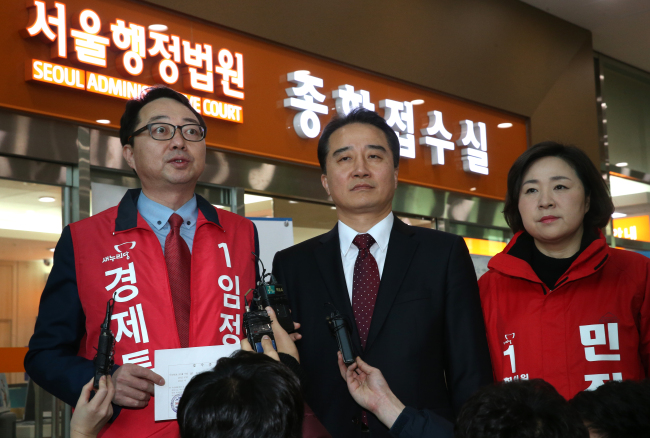Preliminary candidates for the April general elections on Monday filed a lawsuit against the National Assembly and incumbent lawmakers for violating their rights, as it appeared unlikely for the lawmakers to determine the new constituencies by the end of the grace period this Friday, already well past the deadline.
The three candidates from the Saenuri Party — Im Jeong-seok, Jeong Seung-yeon and Min Jeong-sim — claimed the Assembly violated the law since it had abandoned its obligation to redraw constituencies by the legal deadline of Dec. 31, 2015.
Though the Assembly’s speaker granted the lawmakers a seven-day extension before he exercises his authority to push through the election bill on Jan. 8, the ruling Saenuri Party and the main opposition Minjoo Party of Korea have yet to resolve their differences over the rezoning scheme.
“The National Assembly is to blame for this unprecedented situation. Many political aspirants and preliminary candidates are treated unfairly because they do not know where they should run for the elections. It is a violation of the people’s right to vote and happiness,” the candidates said in a statement.
 |
| Preliminary candiates hold press conference after filing a lawusit againt the National Assembly over its failure to meet legal deadline for determining new constituencies. Yonhap |
On the same day, another prospective candidate Kwak Gye-taek filed an injunction request in Busan District Court, urging the court to prohibit the incumbent Saenuri lawmaker Rep. Yoo Ki-joon from rolling out pamphlets detailing his job performance at the Assembly.
Kwak asserted that distribution of such documents prior to a legal campaign period could constitute a violation of the Elections Law, because the incumbent lawmakers have the ability to make and distribute papers on their projects related to their constituencies, while the newcomers do not.
By law, preliminary candidates can engage in an initial level of campaigning, such as opening an office, hanging placards and hiring three or fewer campaigners.
Assembly Speaker Chung Ui-hwa, meanwhile, repeated his commitment to use his power to call for a vote on the election bill and continued to bridge the gap between the rival parties amid the electoral committee’s stalled efforts to review the speakers’ meditation.
“We have reached a pretty critical situation. I will be considering due measures,” he told reporters. Hours later, Chung arranged a luncheon with the leaders of the major parties and urged them to reach a consensus to avert further electoral crisis.
The constituency law became invalid as of Jan. 1, and Chung proposed to pass a bill that includes a similar electoral map to the existing one — 246 seats for local constituencies and 54 for proportional representatives.
Despite its commitment to issue a specific guideline by Jan. 5, the electoral committee under the National Election Commission has failed to draw a compromise version. The committee must finalize the version and submit it for review in order for the Assembly speaker to put it to a plenary vote.
As the electoral deadlock continued, the Assembly secretariat and even some lawmakers voiced their frustration over the impasse. Rep. Kim Young-woo of the Saenuri Party compared the situation to a “comedy show,” as candidates are forced to kick off their election campaign without knowing where to run.
“The Assembly is the place where the lawmakers enact the law and comply with it. Given this, we have little excuse to the people for creating such a lawless situation. Some say it is the epitome of irresponsible politics. We deserve the blame,” said Park Heong-joon, secretary general of the National Assembly.
By Yeo Jun-suk (jasonyeo@heraldcorp.com)

